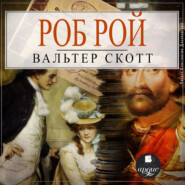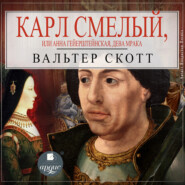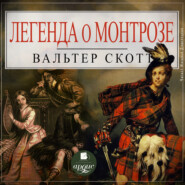По всем вопросам обращайтесь на: info@litportal.ru
(©) 2003-2024.
✖
The Fortunes of Nigel
Настройки чтения
Размер шрифта
Высота строк
Поля
“Faith, I know not,” said Jenkin; “he looks dangerous, that fellow – he will hit some one over the noddle before he goes far. – Hark! – hark! – they are rising.”
Accordingly, the well-known cry of, “‘Prentices – ‘prentices – Clubs – clubs!” now rang along Fleet Street; and Jenkin, snatching up his weapon, which lay beneath the counter ready at the slightest notice, and calling to Tunstall to take his bat and follow, leaped over the hatch-door which protected the outer-shop, and ran as fast as he could towards the affray, echoing the cry as he ran, and elbowing, or shoving aside, whoever stood in his way. His comrade, first calling to his master to give an eye to the shop, followed Jenkin’s example, and ran after him as fast as he could, but with more attention to the safety and convenience of others; while old David Ramsay, with hands and eyes uplifted, a green apron before him, and a glass which he had been polishing thrust into his bosom, came forth to look after the safety of his goods and chattels, knowing, by old experience, that, when the cry of “Clubs” once arose, he would have little aid on the part of his apprentices.
CHAPTER II
This, sir, is one among the Seignory,
Has wealth at will, and will to use his wealth,
And wit to increase it. Marry, his worst folly
Lies in a thriftless sort of charity,
That goes a-gadding sometimes after objects,
Which wise men will not see when thrust upon them.
The Old Couple.
The ancient gentleman bustled about his shop, in pettish displeasure at being summoned hither so hastily, to the interruption of his more abstract studies; and, unwilling to renounce the train of calculation which he had put in progress, he mingled whimsically with the fragments of the arithmetical operation, his oratory to the passengers, and angry reflections on his idle apprentices. “What d’ye lack, sir? Madam, what d’ye lack – clocks for hall or table – night-watches – day watches? —Locking wheel being 48 – the power of retort 8 – the striking pins are 48– What d’ye lack, honoured sir? —The quotient – the multiplicand– That the knaves should have gone out this blessed minute! —the acceleration being at the rate of 5 minutes, 55 seconds, 53 thirds, 59 fourths– I will switch them both when they come back – I will, by the bones of the immortal Napier!”
Here the vexed philosopher was interrupted by the entrance of a grave citizen of a most respectable appearance, who, saluting him familiarly by the name of “Davie, my old acquaintance,” demanded what had put him so much out of sorts, and gave him at the same time a cordial grasp of his hand.
The stranger’s dress was, though grave, rather richer than usual. His paned hose were of black velvet, lined with purple silk, which garniture appeared at the slashes. His doublet was of purple cloth, and his short cloak of black velvet, to correspond with his hose; and both were adorned with a great number of small silver buttons richly wrought in filigree. A triple chain of gold hung round his neck; and, in place of a sword or dagger, he wore at his belt an ordinary knife for the purpose of the table, with a small silver case, which appeared to contain writing materials. He might have seemed some secretary or clerk engaged in the service of the public, only that his low, flat, and unadorned cap, and his well-blacked, shining shoes, indicated that he belonged to the city. He was a well-made man, about the middle size, and seemed in firm health, though advanced in years. His looks expressed sagacity and good-humour: and the air of respectability which his dress announced, was well supported by his clear eye, ruddy cheek, and grey hair. He used the Scottish idiom in his first address, but in such a manner that it could hardly be distinguished whether he was passing upon his friend a sort of jocose mockery, or whether it was his own native dialect, for his ordinary discourse had little provincialism.
In answer to the queries of his respectable friend, Ramsay groaned heavily, answering by echoing back the question, “What ails me, Master George? Why, every thing ails me! I profess to you that a man may as well live in Fairyland as in the Ward of Farringdon-Without. My apprentices are turned into mere goblins – they appear and disappear like spunkies, and have no more regularity in them than a watch without a scapement. If there is a ball to be tossed up, or a bullock to be driven mad, or a quean to be ducked for scolding, or a head to be broken, Jenkin is sure to be at the one end or the other of it, and then away skips Francis Tunstall for company. I think the prize-fighters, bear-leaders, and mountebanks, are in a league against me, my dear friend, and that they pass my house ten times for any other in the city. Here’s an Italian fellow come over, too, that they call Punchinello; and, altogether – ”
“Well,” interrupted Master George, “but what is all this to the present case?”
“Why,” replied Ramsay, “here has been a cry of thieves or murder, (I hope that will prove the least of it amongst these English pock-pudding swine!) and I have been interrupted in the deepest calculation ever mortal man plunged into, Master George.”
“What, man!” replied Master George, “you must take patience – You are a man that deals in time, and can make it go fast and slow at pleasure; you, of all the world, have least reason to complain, if a little of it be lost now and then. – But here come your boys, and bringing in a slain man betwixt them, I think – here has been serious mischief, I am afraid.”
“The more mischief the better sport,” said the crabbed old watchmaker. “I am blithe, though, that it’s neither of the twa loons themselves. – What are ye bringing a corpse here for, ye fause villains?” he added, addressing the two apprentices, who, at the head of a considerable mob of their own class, some of whom bore evident marks of a recent fray, were carrying the body betwixt them.
“He is not dead yet, sir,” answered Tunstall.
“Carry him into the apothecary’s, then,” replied his master. “D’ye think I can set a man’s life in motion again, as if he were a clock or a timepiece?”
“For godsake, old friend,” said his acquaintance, “let us have him here at the nearest – he seems only in a swoon.”
“A swoon?” said Ramsay, “and what business had he to swoon in the streets? Only, if it will oblige my friend Master George, I would take in all the dead men in St. Dunstan’s parish. Call Sam Porter to look after the shop.” So saying, the stunned man, being the identical Scotsman who had passed a short time before amidst the jeers of the apprentices, was carried into the back shop of the artist, and there placed in an armed chair till the apothecary from over the way came to his assistance. This gentleman, as sometimes happens to those of the learned professions, had rather more lore than knowledge, and began to talk of the sinciput and occiput, and cerebrum and cerebellum, until he exhausted David Ramsay’s brief stock of patience.
“Bell-um! bell-ell-um!” he repeated, with great indignation; “What signify all the bells in London, if you do not put a plaster on the child’s crown?”
Master George, with better-directed zeal, asked the apothecary whether bleeding might not be useful; when, after humming and hawing for a moment, and being unable, upon the spur of the occasion, to suggest any thing else, the man of pharmacy observed, that it would, at all events, relieve the brain or cerebrum, in case there was a tendency to the depositation of any extravasated blood, to operate as a pressure upon that delicate organ.
Fortunately he was adequate to performing this operation; and, being powerfully aided by Jenkin Vincent (who was learned in all cases of broken heads) with plenty of cold water, and a little vinegar, applied according to the scientific method practised by the bottle-holders in a modern ring, the man began to raise himself on his chair, draw his cloak tightly around him, and look about like one who struggles to recover sense and recollection.
“He had better lie down on the bed in the little back closet,” said Mr. Ramsay’s visitor, who seemed perfectly familiar with the accommodations which the house afforded.
“He is welcome to my share of the truckle,” said Jenkin, – for in the said back closet were the two apprentices accommodated in one truckle-bed, – “I can sleep under the counter.”
“So can I,” said Tunstall, “and the poor fellow can have the bed all night.”
“Sleep,” said the apothecary, “is, in the opinion of Galen, a restorative and febrifuge, and is most naturally taken in a truckle-bed.”
“Where a better cannot be come by,” – said Master George; “but these are two honest lads, to give up their beds so willingly. Come, off with his cloak, and let us bear him to his couch – I will send for Dr. Irving, the king’s chirurgeon – he does not live far off, and that shall be my share of the Samaritan’s duty, neighbour Ramsay.”
“Well, sir,” said the apothecary, “it is at your pleasure to send for other advice, and I shall not object to consult with Dr. Irving or any other medical person of skill, neither to continue to furnish such drugs as may be needful from my pharmacopeia. However, whatever Dr. Irving, who, I think, hath had his degrees in Edinburgh, or Dr. Any-one-beside, be he Scottish or English, may say to the contrary, sleep, taken timeously, is a febrifuge, or sedative, and also a restorative.”
He muttered a few more learned words, and concluded by informing Ramsay’s friend in English far more intelligible than his Latin, that he would look to him as his paymaster, for medicines, care, and attendance, furnished, or to be furnished, to this party unknown.
Master George only replied by desiring him to send his bill for what he had already to charge, and to give himself no farther trouble unless he heard from him. The pharmacopolist, who, from discoveries made by the cloak falling a little aside, had no great opinion of the faculty of this chance patient to make reimbursement, had no sooner seen his case espoused by a substantial citizen, than he showed some reluctance to quit possession of it, and it needed a short and stern hint from Master George, which, with all his good-humour, he was capable of expressing when occasion required, to send to his own dwelling this Esculapius of Temple Bar.
When they were rid of Mr. Raredrench, the charitable efforts of Jenkin and Francis, to divest the patient of his long grey cloak, were firmly resisted on his own part. – “My life suner – my life suner,” he muttered in indistinct murmurs. In these efforts to retain his upper garment, which was too tender to resist much handling, it gave way at length with a loud rent, which almost threw the patient into a second syncope, and he sat before them in his under garments, the looped and repaired wretchedness of which moved at once pity and laughter, and had certainly been the cause of his unwillingness to resign the mantle, which, like the virtue of charity, served to cover so many imperfections.
The man himself cast his eyes on his poverty-struck garb, and seemed so much ashamed of the disclosure, that, muttering between his teeth, that he would be too late for his appointment, he made an effort to rise and leave the shop, which was easily prevented by Jenkin Vincent and his comrade, who, at the nod of Master George, laid hold of and detained him in his chair.
The patient next looked round him for a moment, and then said faintly, in his broad northern language – “What sort of usage ca’ ye this, gentlemen, to a stranger a sojourner in your town? Ye hae broken my head – ye hae riven my cloak, and now ye are for restraining my personal liberty! They were wiser than me,” he said, after a moment’s pause, “that counselled me to wear my warst claithing in the streets of London; and, if I could have got ony things warse than these mean garments,” – (“which would have been very difficult,” said Jin Vin, in a whisper to his companion,) – “they would have been e’en ower gude for the grips o’ men sae little acquented with the laws of honest civility.”
“To say the truth,” said Jenkin, unable to forbear any longer, although the discipline of the times prescribed to those in his situation a degree of respectful distance and humility in the presence of parents, masters, or seniors, of which the present age has no idea – “to say the truth, the good gentleman’s clothes look as if they would not brook much handling.”
“Hold your peace, young man,” said Master George, with a tone of authority; “never mock the stranger or the poor – the black ox has not trod on your foot yet – you know not what lands you may travel in, or what clothes you may wear, before you die.”
Vincent held down his head and stood rebuked, but the stranger did not accept the apology which was made for him.
“I am a stranger, sir,” said he, “that is certain; though methinks, that, being such, I have been somewhat familiarly treated in this town of yours; but, as for my being poor, I think I need not be charged with poverty, till I seek siller of somebody.”
“The dear country all over,” said Master George, in a whisper, to David Ramsay, “pride and poverty.”
But David had taken out his tablets and silver pen, and, deeply immersed in calculations, in which he rambled over all the terms of arithmetic, from the simple unit to millions, billions, and trillions, neither heard nor answered the observation of his friend, who, seeing his abstraction, turned again to the Scot.
“I fancy now, Jockey, if a stranger were to offer you a noble, you would chuck it back at his head?”
“Not if I could do him honest service for it, sir,” said the Scot; “I am willing to do what I may to be useful, though I come of an honourable house, and may be said to be in a sort indifferently weel provided for.”
“Ay!” said the interrogator, “and what house may claim the honour of your descent?”
“An ancient coat belongs to it, as the play says,” whispered Vincent to his companion.
“Come, Jockey, out with it,” continued Master George, observing that the Scot, as usual with his countrymen, when asked a blunt, straightforward question, took a little time before answering it.
“I am no more Jockey, sir, than you are John,” said the stranger, as if offended at being addressed by a name, which at that time was used, as Sawney now is, for a general appellative of the Scottish nation. “My name, if you must know it, is Richie Moniplies; and I come of the old and honourable house of Castle Collop, weel kend at the West-Port of Edinburgh.”
“What is that you call the West-Port?” proceeded the interrogator.
“Why, an it like your honour,” said Richie, who now, having recovered his senses sufficiently to observe the respectable exterior of Master George, threw more civility into his manner than at first, “the West-Port is a gate of our city, as yonder brick arches at Whitehall form the entrance of the king’s palace here, only that the West-Port is of stonern work, and mair decorated with architecture and the policy of bigging.”
“Nouns, man, the Whitehall gateways were planned by the great Holbein,” answered Master George; “I suspect your accident has jumbled your brains, my good friend. I suppose you will tell me next, you have at Edinburgh as fine a navigable river as the Thames, with all its shipping?”
“The Thames!” exclaimed Richie, in a tone of ineffable contempt – “God bless your honour’s judgment, we have at Edinburgh the Water-of-Leith and the Nor-loch!”
“And the Pow-Burn, and the Quarry-holes, and the Gusedub, ye fause loon!” answered Master George, speaking Scotch with a strong and natural emphasis; “it is such land-loupers as you, that, with your falset and fair fashions, bring reproach on our whole country.”

















